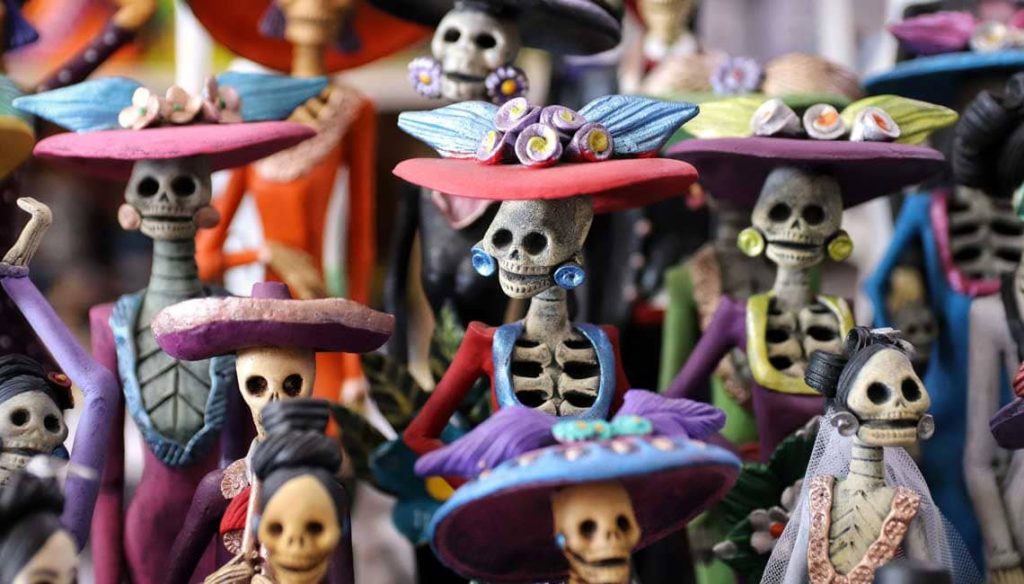
@m_mendez_ix
https://bit.ly/3BSGhKc
Men die, but ideas remain.
Anonymous
Information is a tool that strengthens us, especially to learn about a subject as delicate as death. It is the only certainty of life, but it is full of mystery, sometimes misunderstanding, and every time it appears, it floods those who face it with profound pain. For this reason, some people have dedicated themselves to deepening, investigating, and providing information on this subject, to better understand it and it has been a very important help in the grieving process.
This is the case of a book that has been recommended to us: Rites and Myths of Death in Mexico and other cultures (2000). The authors are Marco Antonio Gómez Pérez who was born in 1953 in Mexico City. He is a journalist, television reporter, radio producer, and co-author of books on controversial topics such as prophecies, elves, gnomes, magical beings, fairies, and ghosts. He has investigated cloning and the future of humanity. The co-author is José Arturo Delgado Solís who was born in Mexico City in 1957. He is a broadcaster, journalist, and social anthropologist.
By way of background, we must remember that during the last century little was said about this topic. In some countries, it is considered bad luck or a bad omen to name it, due to the horrors that they experienced in the different world wars, that caused people to avoid closeness with matters related to death and have come to repress pain. So the grieving process for the loss of a loved one was not treated and had serious consequences on people’s mental health.
There was no treatment for terminal patients and they died in hospitals without the human closeness of their loved ones and everyone avoided talking about the imminent end. Death was even considered a failure of medical science since scientific advances, vaccines, and effective medicines reduced the mortality of the world population.
It was in the 1960s that Dr. Elisabeth Kübler-Ross began work in hospitals in the United States, raising awareness of the emotional needs of the dying, their concerns, and those of their families and friends. This awareness became a preparatory seminar for doctors in schools and spread to universities around the world. Today there are end-of-life hospices in that country for terminally ill patients with palliative care, therapy, spiritual help, and the loving closeness of their loved ones.
The book we are discussing today is an important contribution to raising awareness about the subject of death. It explores the way in which various social groups have understood, explained, and assimilated it throughout history. Already from the prologue, the authors appeal to the feelings that it generates, such as; fear, uncertainty, sadness, and compassion. The reflection and the invitation for the reader to understand that death is not only the end of physical life and to ask ourselves what happens after death begins.
The authors propose we take a journey through the thought of various cultures of the world in order to obtain the explanations that they have inherited to this day. The transcendental destinies that exist for other religions or philosophies, among which is reincarnation or the evolution to a luminous dimension after death. The resurrection for the Judeo-Christian traditions and the existence of a heaven or hell as the final destination of mortals.
Throughout 11 chapters that cover a great historical period, the authors devote special attention to the explanation of death in pre-Hispanic Mexico, the preparation of funerary rituals, the places where the dead travel, and an explanation of human sacrifice. what those people practiced. The transformation of this ideology with the arrival of Europeans and the influence of the Catholic religion has shaped the way Mexicans think about death. They mention, of course, the important tradition of the Day of the Dead.
Then they invite us to personal reflection through a forceful question: are we prepared to die? With this they give us explanations about the importance of prevention and the possibility of preparing for our own death, they even invite us to reflect on controversial issues: euthanasia, suicide, and murder.
In simple words, aimed at a diverse public, not specialized in medicine, thanatology or science. This book aims to bring us closer to the subject of death as something irremediable, but that gives us the opportunity to value life and be aware of our actions. They also invite us to recognize the pain and personal work of mourning the loss of loved ones.
Interesting is the research they dedicate in a special chapter to the cult of the Holy Death, an image that comes from medieval Europe, at a time when death was near or daily due to epidemics and wars. The authors mention its powerful attributions, magical properties and that it is highly revered by the police and criminals, as they always find themselves in the circumstance of executing people, so they feel twinned with death.
In order not to reveal more of the interesting information that these essays present us and invite us to read this book, it only remains to comment that the authors give us ideas about the origin of the fear of death. They tell us about premature burials in times of poor medical knowledge. In our days the fear of death arises from leaving unfinished business, unprotected minors, or property without a will.
The journalistic vocation of the authors prevails and the book has testimonies from people who give their opinion, for example, about their experiences with ghosts or the work with specialists in thanatology where they reveal the importance of this support for the grieving process, legal aspects in prevention and advance directive. They have tried to encompass the various ideological, legal, philosophical, and scientific points of view. All in order to enlighten us and, above all, to make the theme of death visible, to verbalize the various ideas that are held about it.
Muy loable el trabajo de Marco Antonio Gómez Pérez y José Arturo Delgado Solís, bien documentado. Te invitamos a buscarlo, a leerlo, a compartir tu opinión y te recordamos que en Del Pueblo Funeral Home hacemos fáciles los momentos más difíciles.
The well-documented work of Marco Antonio Gómez Pérez and José Arturo Delgado Solís is highly commendable. We invite you to look for it, to read it, to share your opinion and we remind you that at Del Pueblo Funeral Home we make the most difficult moments easy.
